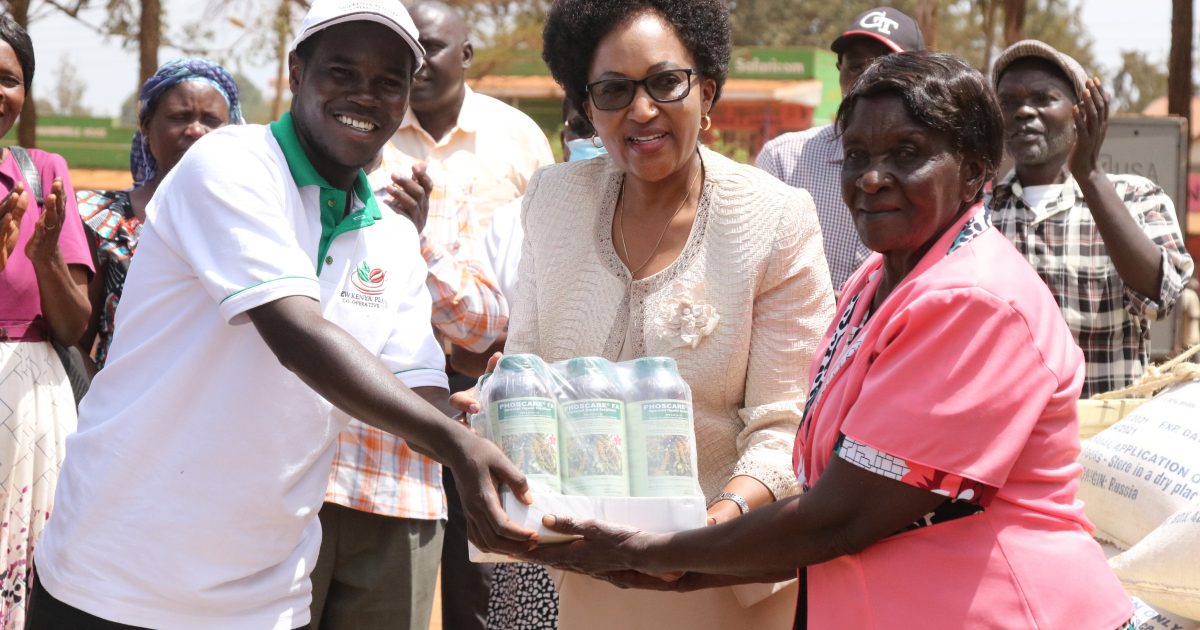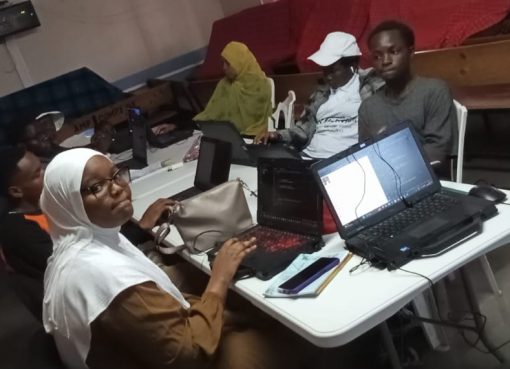The New Kenya Planters Cooperative Union (KPCU) has unveiled the first distribution of subsidized coffee inputs worth Sh800,000 supplied to farmers in Trans Nzoia County to 41 coffee farmers from the KAMISSA coffee farmers’ cooperative in Kiminini sub-county.
Speaking during the launch at Kiminini Primary school, Trans Nzoia CEC member for Agriculture Mary Nzomo, said the programme was aimed at improving the quality and quantities of coffee produced in the county and it is going a long way in reducing the burden of coffee production hence increasing income for the farmers.
“I urge all coffee farmers in the county to reach out and grab this opportunity by only paying 60 per cent of the cost of inputs while 40 per cent is catered for by the government,” CEC Nzomo said.
She added that the County Department of Agriculture and Cooperative Development would continue to offer support to our coffee farmers through training and provision of subsidized seedlings.
“Some partners have already shown interest in setting up a coffee processing plant in the county but the coffee quantities produced in the county have been discouraging. Any support to the coffee farmers in the county will see them achieve the targeted produce,” said Mrs Nzomo.
She added that the county government under its crops diversification programme is offering coffee seedling subsidies to farmers and since 2014, this has seen an increase in coffee acreage in the county.
Nzomo added that the Department of Agriculture has so far distributed over 10,000 subsidized coffee seedlings at Sh20 each to encourage more farmers to embrace coffee farming in the county.
According to the Coffee Board of Kenya report, Trans Nzoia coffee farmers were able to receive 250,000,000kg from the 1,500 hectares of coffee farming in the county.
“I assure our farmers that once we achieve the desired qualities and quantities of coffee produced, we shall have our own coffee processing factory,” Nzomo said.
On his part, the new KPCU representative in Trans Nzoia Moses Ndwasi, and Bungoma counties, said they have brought KAMISSA farmers’ cooperative society subsidised fertilizer that the group members managed to pay 60 per cent.
Ndwasi said the programme started three months after its launch and the new KPCU is in the process of registering farmers to benefit from the fertilizer subsidy government programme.
“I call upon all the farmers who have not registered to come out and be registered so that they cannot be left out of the programme. We will give out fertilizers like NPK 17:17:17 and CAN. We also have other agrochemicals like foliar feeds, pesticides, and herbicides that can be used in improving the quality of our coffee in the country,” he said.
Ndwasi added that the new KPCU targets more than 80,000 farmers through the subsided programme in the country and so far, in Trans Nzoia, they have been able to register more than 5000 farmers.
Mr. Aillah Omoto one of the farmers from the KAMISSA farmers’ cooperative in Kiminini, applauded the effort by the national government to cushion coffee farmers from the high cost of farm inputs.
Omoto also thanked the county government for supplying farmers in the county with subsidized coffee seedlings and also the farmers for embracing coffee farming.
He said, last year, the cooperative sent 3400 kilograms P1 to CMS in Eldoret, citing the high cost of transport as one of the challenges the coffee farmers were facing apart from the high cost of farm inputs before the introduction of the farm subsidies.
Alfred Muse, the treasurer of KAMISSA farmers’ Cooperative society in Kiminini, thanked the partnership between the New KPCU and the coffee farmers through the coffee value chain programme.
“Many farmers are facing marketing challenges in their coffee due to the country’s free-market policy for coffee that led to most farmers being misled to sell that coffee produce at throwaway prices. For example, if a farmer sells his or her coffee parchment of 2 Kilograms of coffee through a cooperative, it goes at Sh800, but if a farmer decides to sell through other means, the 2 Kg fetches only 200 shillings so this is a very big challenge to the coffee farmers, he said.
The other challenge is that in Trans Nzoia County, the coffee production is very low because farmers can get up to one kilogram of coffee berries per tree which is way too low compared with coffee farmers from other parts of this country which we need to seriously look into.
By Kosuri Valarie





